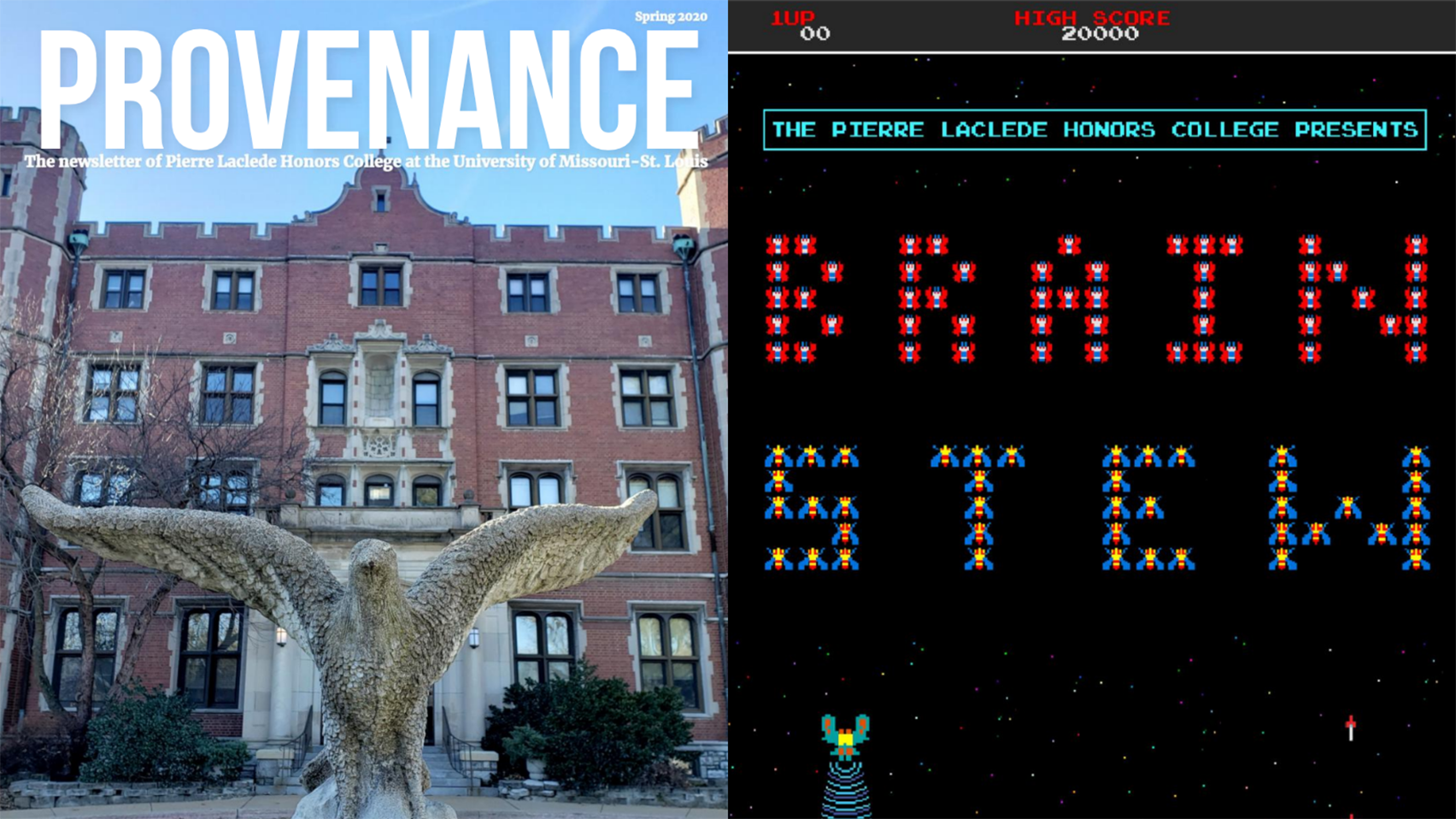
UMSL Honors College publications Provenance and Brain Stew placed first in the National Collegiate Honors Council Newsletter Contest for the first time this year.
The first semester that Sammy Jacobs started writing for Brain Stew, the publication won third place at the National Collegiate Honors Council Newsletter Contest.
That felt like a big deal for the University of Missouri–St. Louis Pierre Laclede Honors College student. That Brain Stew, a student-run zine that’s an Honors College home for wildly uncensored humor and other writings, found an appreciative audience with the large membership organization spoke to the strength of the publication – and amused its editors.
In response, they published satirical thank you notes that they submitted as part of judging for the next year and won third again. But the following year saw a change in fortunes.

From left: Director of Student Services and Alumni Relations and Associate Teaching Professor Dan Gerth, former Brain Stew Editor Nicole Gevers and current Editor Sammy Jacobs accepted a third place award in Boston’s Prudential Tower in 2018.
“We didn’t win anything after two years of third place,” she said. “I kind of felt bad.”
That streak didn’t last long. This year, the Honors College won first place twice in the annual competition, both in the Student Electronic category for Brain Stew and in Faculty/Administrator/Student Electronic for Provenance, the Honors College alumni newsletter.
Though the college has had publications place before, it has never outright won, much less in two categories. For Jacobs, the current editor, and others, that was good news.
“OK, cool,” she said. “We’re good. We’re back up to where we were. It feels really rewarding. I don’t think there’s any worse or better way to describe it, for me at least. Like all the hours and the jokes that I’ve made that were bad, or at least I thought were bad, they’ve all paid off now, especially since I’m graduating. It’s ending on a good note for me.”
But what makes the dual win even more sweet is how well it echoes the Honors College ethos. UMSL’s Honor College is somewhat unique within its peer group for the variety of majors that make up its student body. Some of the most popular studies within the college are nursing, business, psychology, pre-med and pre-health rather than the expected humanities majors.
Part of what ties those groups together is a focus on producing quality writers.
“We want to encourage our students to participate in writing as much as possible,” Honors College Dean Ed Munn Sanchez said. “It’s really important that our students develop a voice and ability to write beyond what they do in the classroom. Academic papers are great, but they aren’t funny.
“The other thing is that comedy writing is particularly difficult. If you start talking about comedy writing, it stops being funny, so it’s kind of terrible to try and teach. But the reality is that it’s hard to write comedy, and if you can write comedy successfully, you develop skills. It’s all part of our larger program.”
Jacobs noted that it has strengthened her pre-writing skills such as outlining and has helped her find her style. Another Brain Stew editor, Monica Holtmeyer, is in agreement.
“The more you’re actively writing, the more you’re going to improve,” she said. “It challenged me because I’ve never done satirical or comical writing. Everybody thinks that might be easy, but there’s definitely days where you’re like, ‘Oh, this is actually hard.’”
But Munn Sanchez said that’s even though Brain Stew and Provenance teach skills, that’s not the main point.
“When you talk about Brain Stew or Provenance, particularly Brain Stew, it’s just a good publication,” he said. “It’s just funny. It has all these other purposes, and that’s wonderful. But the goal is just to have Brain Stew. Its purpose is to produce a funny magazine. All the other stuff is great, and there are many reasons to support it, but it’s really about putting out a good piece of work, which is for us in Honors in the end is what we’re trying to teach the students.”
While Brain Stew is produced by students with little faculty or staff interference other than from its advisor, Director of Student Services and Alumni Relations and Associate Teaching Professor Dan Gerth, Provenance is a collaboration among faculty, staff, students and alumni.
Gerth serves as editor for the text, the students for the visuals and they collaborate on story ideas. Though Provenance’s origins date back to the early ’90s, publication hasn’t been continuous until Gerth restarted it in 2015.
“How do we, an honors college that’s 25 years old and has some of the most loyal alumni imaginable, not have something like this?” he said. “The main goal was to just have something, and then we didn’t really decide what it should be like. This organically came together. We try to strike a balance between keeping alumni abreast of interesting things that are going on in the college and telling students about interesting career options and career paths that alumni are engaged in.”
Some standout examples of the types of content published are an interview with alumna and Oxygen Network writer Sharon Lynn Pruitt or with Shawntelle Fisher, founder of the nonprofit SoulFisher Ministries, or nostalgic content for alumni such as a history of the freshmen seminars.
That’s in contrast to Brain Stew, which publishes whatever the editors find hilarious or compelling. Some favorites include snarky reviews of all the Culver’s custard flavors, astrology with accompanying hand-drawn signs, longform movie reviews by a student who worked in a theater and the adventures of Fratty B, written by Jacobs and based on her boyfriend.
Holtmeyer started her tenure at the publication by writing a regular column, Freshman Sass.
“That was literally me sassing whatever I wanted to sass,” she said. “My first issue was just an entire rant about how our university apartment complex on campus, Meadows, has a bunch of different fees for everything. So if you hit the front gate, it was $300. Don’t take the trash out? $10, and then I continued, ‘Don’t even bother stepping on the grass because that’s at least $5.’”
For any potential readers of Brain Stew, it’s important to come in with the correct impression, Gerth noted.
“It’s an uncensored, satirical student publication,” he said. “Proceed at your own risk.”














